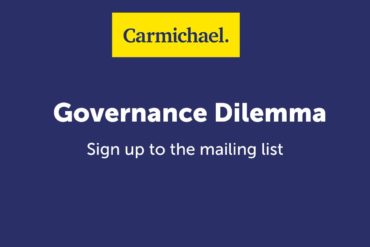Target Audience
New Board Members, Directors, Charity Trustees of non-profit organisations.
Outline
Becoming a member of a non-profit board is a rewarding and at times challenging task. Understanding the role and responsibilities of a board member makes the job easier. In this eLearning course we provide you with a structured sequence of topics, each of which is designed to further your knowledge of corporate governance and support your understanding of your voluntary board role.
This course can be accessed for up to 60 days after purchase.
Course Structure
The course comprises eight lessons and takes approximately three hours to complete.
Lesson 1: Governance Overview
Lesson 2: Board Member Roles and Responsibilities
Lesson 3: The Chairperson
Lesson 4: Board Relationship with CEO/Staff
Lesson 5: Company Limited by Guarantee
Lesson 6: Charities and Charity Trustees
Lesson 7: Getting the most from Board Induction
Lesson 8: Why Boards Underperform
Upon completion of the course lessons, you may wish to complete the course quiz. Successful completion of the course quiz provides you with an opportunity to download a Certificate of Completion.
Note: Once an e-Learning course is booked, it could take up to 48 hours for login details to be provided.
Additional Note: When booking, please make sure to input all the correct contact details onto the booking form as the information will be used to create learner profiles. Should information be entered incorrectly it could delay the booking process.
Learners from outside the Republic of Ireland are advised to contact training@carmichaelireland.ie before booking, in order to ensure proper access to the course.
Target Audience
New Board Members, Directors, Charity Trustees of non-profit organisations.
Outline
Many thousands of non-profit organisations in Ireland are also registered charities. This means these organisations meet ‘The Charity Test’ and can thus be entered onto the register of charities in Ireland by the Charities Regulator.
The board members of non-profit organisations that are also registered charities are referred to as charity trustees. A list of the trustees for each registered charity in Ireland is publicly viewable on the Charities Regulator website.
Charity trustees must ensure that their charities comply with their obligations under the Charities Act 2009 and the related reporting and compliance obligations set out by the Charities Regulator.
This course can be accessed for up to 60 days after purchase.
Course Structure
In this course, we have created an overview of what a trustee should be aware of when joining a charity board. The course comprises five lessons and takes approximately one hour to complete.
Lesson 1: The Charities Act 2009
Lesson 2: Functions of the Charities Regulatory Authority
Lesson 3: General duties of charity trustees
Lesson 4: The Charities Governance Code
Lesson 5: Charity compliance requirements
Lesson 6: Charities Amendment Act 2024
Upon completion of the course lessons, you may wish to complete the course quiz. Successful completion of the course quiz provides you with an opportunity to download a Certificate of Completion.
Note: Once an e-Learning course is booked, it could take up to 48 hours for login details to be provided.
Additional Note: When booking, please make sure to input all the correct contact details onto the booking form as the information will be used to create learner profiles. Should information be entered incorrectly it could delay the booking process.
Learners from outside the Republic of Ireland are advised to contact training@carmichaelireland.ie before booking, in order to ensure proper access to the course.
Target Audience
Anyone looking to learn about good practice in the important function of taking accurate meeting minutes.
Outline
Accurate minute taking is an essential part of good meeting practice. The keeping of accurate meeting minutes is also an essential requirement for non-profit companies.
This course can be accessed for up to 30 days after purchase.
Course Structure
The course is divided into 5 component parts and takes approx. 30 minutes to review. Participants should allow for additional time to review the minutes template which accompanies the course. Topics are self-contained to facilitate micro-learning for the time conscious participant.
1. Taking Meeting Minutes
In this lesson, we review the role of minute taker and the different types of minutes that may be taken at meetings.
2. How to Take Meeting Minutes
In this lesson, the focus is on discursive minutes and how such minutes may be recorded.
3. Listening Skills
Good listening skills are essential for individuals taking notes during meetings. In this lesson, we learn more about active listening and methods for improving listening skills.
4. Note Taking During Meetings
In this lesson, we consider how best to prepare for the role of minute taker at a meeting.
5. How to Help Luke?
In this lesson, we apply what we have learned in previous lessons to a relevant hypothetical situation.
Upon successfully completing the course, participants may download free of charge a course Certificate of Completion.
Note: Once an e-Learning course is booked, it could take up to 48 hours for login details to be provided.
Additional Note: When booking, please make sure to input all the correct contact details onto the booking form as the information will be used to create learner profiles. Should information be entered incorrectly it could delay the booking process.
Learners from outside the Republic of Ireland are advised to contact training@carmichaelireland.ie before booking, in order to ensure proper access to the course.
elearning course
This is a test course
Target Audience
Chairpersons of non-profit organisations or anyone thinking of becoming a Chairperson.
Outline
The role of board Chairperson is an honorary role. There is no legal requirement under the Charities Act or the Companies Act for a board or committee to appoint a board Chairperson. However, Boards should be mindful of obligations contained in their organisation’s constitution and obligations under any other legislation or regulation their organisation may be subject to. Appointing a board Chairperson makes good, practical sense if the work of a non-profit board is to be progressed satisfactorily. Upon appointment, a Chairperson takes on particular duties and responsibilities appropriate to the role. In this course, we review the role of board Chairperson.
This course can be accessed for up to 30 days after purchase.
Course Structure
The course is divided into 8 component parts and takes approx. 1 hour to review. Participants should allow for additional time to review the templates and Board Handbook which accompany the course. Topics are self-contained to facilitate micro-learning for the time conscious participant.
1. Introduction
People can be reluctant to take on the role of Chairperson, as it is often perceived to carry with it a significant workload. This should not be the case however, if a fair distribution of work is agreed by all committee or board members!
2. The Responsibilities of a Board
This lesson outlines the core functions of the board of directors and the principles of good governance.
3. The Role of a Chairperson
The duties associated with the Chairperson’s role are outlined in this lesson.
4. Leading the Board
A leader leads from the front, but not so far in front that followers lose sight of him or her! So it is with a board chairperson. The Chair must help ensure that the board complies with governance best practice, adheres to its legal responsibilities and fairly represents the interests of members. Leading the board means helping board members to govern effectively.
5. Setting the Agenda
Agendas help Chairpersons to structure the flow of board meetings and provide opportunities for the Chairperson to bring people back on topic. Agendas help to make visible the topics that require board decisions and discussions.
6. Chairing Board Meetings
The nature and communication styles of the personalities sitting around a board table, can certainly affect a meeting. But remember that there are tools and techniques that a Chairperson can use to help facilitate a board meeting more effectively. This lesson explores this topic further.
7. Working with Senior Staff
The relationship between a non-profit’s most senior manager and its board is critical. One board member is typically delegated the responsibility for line managing the most senior staff member e.g. CEO or Project Co-ordinator. The Chairperson of a board is usually delegated such a responsibility.
8. Succession Planning
Each board needs to rejuvenate and stay energised, if it is to provide effective leadership on an ongoing basis. Therefore, the chairperson (working with board members and senior staff) should actively seek nominations and expressions of interest from potential board members.
Upon successfully completing the course, participants may download free of charge a course Certificate of Completion.
Note: Once an e-Learning course is booked, it could take up to 48 hours for login details to be provided.
Additional Note: When booking, please make sure to input all the correct contact details onto the booking form as the information will be used to create learner profiles. Should information be entered incorrectly it could delay the booking process.
Learners from outside the Republic of Ireland are advised to contact training@carmichaelireland.ie before booking, in order to ensure proper access to the course.
Target Audience
This course is designed for social enterprises that are registered or intend to register as charities. It provides an easy-to-follow guide for board members, charity trustees, managers and volunteers tasked with implementing good governance practices that are compliant with the Charities Governance Code.
The course is also designed to help new charity trustees learn about their governance role and responsibilities and may form part of board induction training.
The resources and templates that accompany the course may prove helpful for trustees and managers who do not have a background in corporate governance or policy development. This course can be accessed for 12 months after purchase.
Outline
Structured as a practical and instructive 7.5 hours long eLearning course, the Governance and Charities Governance Code course and resource site provides you with a step-by-step approach to implementing appropriate standards of good governance in your non-profit organisation.
What is the Charities Governance Code?
The Charities Governance Code is made up of –
- six principles of governance, which all charities should apply,
- core standards that we expect all charities to meet when putting the principles into action, and
- additional standards that reflect best practice for charities with high levels of income and/or complex organisational and funding structures and/or a significant number of employees.
The Code was written with volunteer-only charities and charities with a small number of paid staff in mind, as this reflects the reality of the charity sector in Ireland where these two groups make up the majority of registered charities.
Additional governance standards have been included, which more complex charities are expected to meet.
For these reasons, the Code is relevant for every charity operating in Ireland.
Note: Once an e-Learning course is booked, it could take up to 48 hours for login details to be provided.
Additional Note: When booking, please make sure to input all the correct contact details onto the booking form as the information will be used to create learner profiles. Should information be entered incorrectly it could delay the booking process.
Learners from outside the Republic of Ireland are advised to contact training@carmichaelireland.ie before booking, in order to ensure proper access to the course.
Target Audience
Are you a Board member / Senior Executive Officer of a voluntary or community group? Do you need to develop or enhance your understanding of Risk Management?
Outline
This course can be accessed for up to 90 days after purchase.
To enable learners develop a comprehensive understanding of Risk Management within an organisation and the tools which can be employed to minimise risk.
Understand Risk
- Identify and discuss examples of risk in an organisation (good risk / bad risk)
Understand Risk Categories
- Governance
- Strategic
- Compliance (Legal or Regulatory)
- Operational
- Financial
- Environmental or External
Understand Risk Management and Know Why It Is Important
- Identify and understand relevant risks
- Evaluate risks / Prioritise risks
- Monitor risks and report on their management
- May be a legal/regulatory/compliance requirement
- Reduce possibility of failing to realise objectives
- Reduce possibility of reputational damage
- Better decision making
- Recognise opportunities to benefit from risk
Understand What Makes A Good Risk Management System
- Risk Management Policy
- Risk Management Officer
- Risk Management Process
- Risk Register
- Systems and Controls
- Monitor and Report
Note: Once an e-Learning course is booked, it could take up to 48 hours for login details to be provided.
Additional Note: When booking, please make sure to input all the correct contact details onto the booking form as the information will be used to create learner profiles. Should information be entered incorrectly it could delay the booking process.
Learners from outside the Republic of Ireland are advised to contact training@carmichaelireland.ie before booking, in order to ensure proper access to the course.
Target Audience
This eLearning course is ideally suited to anyone holding the position of board director of a Company Limited by Guarantee, or by people filling the role of Company Secretary. It is also a valuable learning resource for staff members who support board governance.
Outline
This short interactive eLearning course explores the implications of The Companies Act 2014 for Companies Limited by Guarantee (CLG). The practical and easy-to-follow structure of the course is designed to get directors and company secretaries quickly up to speed with what they need to know to comply with the Act.
It is worth noting that all directors appointed to boards post June 1st, 2015 should be aware of their legal duties and undertake to comply with requirements set out in The Companies Act 2014.
This course can be accessed for up to 45 days after purchase.
Topics covered during the course include:
- Role of Company Members
- Legal Duties of Company Directors
- Company Directors – key requirements
- Role of Company Secretaries
- Legal duties of Company Secretaries
- Typical administrative duties of Company Secretaries
- Annual Return Dates
- Implications of The Companies Act 2014 for future registrations
- Implications of the Act for existing companies
- Declaration of Understanding
Each person taking this eLearning course can access and download a PDF copy of the BoardPASS Board Governance Handbook for Irish Non-Profits. A great resource for any board or committee member!
The course is run in collaboration with CramdenTECH, a governance systems and eLearning company providing skills based, micro-learning responsive content for Irish and UK markets.
Note: Once an e-Learning course is booked, it could take up to 48 hours for login details to be provided.
Additional Note: When booking, please make sure to input all the correct contact details onto the booking form as the information will be used to create learner profiles. Should information be entered incorrectly it could delay the booking process.
Learners from outside the Republic of Ireland are advised to contact training@carmichaelireland.ie before booking, in order to ensure proper access to the course.
Target Audience
Anyone wanting a good understanding of the knowledge and skills required to fulfill both the legal duties associated with the role and the administrative duties assigned to the role by the Board.
Outline
Every company limited by guarantee must appoint a Company Secretary. In a company limited by guarantee (the legal structure of choice for most non-profits in Ireland) this role is frequently filled by a board director or staff member. It is the responsibility of a board of directors to ensure that the person acting as its Company Secretary, has the necessary knowledge and skills to fulfil both the legal duties associated with the role and the administrative duties assigned to the role by the Board.
This course can be accessed for up to 60 days after purchase.
Course Structure
The e-learning course is divided into 10 component parts and takes approximately 1.5 hours to review. Practical templates are provided with course topics. Participants should allow for additional time to fully complete the practical work associated with the lessons in the course. Topics are self-contained to facilitate micro-learning for the time conscious participant.
1. Introduction: Company Law in Context
The Companies Act 2014 commenced on June 1st, 2015. In this introductory lesson, we will look at the implications of the Act for existing Companies Limited by Guarantee (CLG) and for those organisations who may wish to register as companies in the future.
2. Company Responsibilities
To identify the key legal responsibilities of a Company Limited by Guarantee.
3. Core Functions of a Board of Directors
To identify the core functions of the Board of Directors and the overarching principles of good corporate governance.
4. Fiduciary Duties of Company Directors
To identify the eight fiduciary duties of Company Directors as set out in Section 228 of The Companies Act 2014.
5. Shadow and De Facto Directors
It is helpful for a company secretary to understand what the terms shadow and de facto director mean. This lesson explains the concept of both.
6. Appointing a Company Secretary
In a CLG, directors must ensure that the Company Secretary has the skills necessary to carry out their role. This means that the appointment of the company secretary must be discussed at board level and the decision to appoint the company secretary recorded in board meeting minutes.
7. Legal Duties of a Company Secretary
This lesson identifies the legal duties of a Company Secretary.
8. Administrative Duties of a Company Secretary
In addition to the legal duties attaching to the role, a board of directors may also assign administrative duties to the company secretary.
9. The Company Constitution
In supporting the Board of Directors, a company secretary must be mindful of the company’s legal requirements to adhere to the the Companies Act 2014 and their reporting obligations to the Companies Registration Office (CRO).
10. Company Secretary: Key Skills
Aside from having very good organisational skills, interpersonal skills and communication skills, there are two practical skills that a board secretary should possess, i.e. the ability to set a meeting agenda in co-operation with the board Chairperson and the ability to take the minutes of board meetings. In this lesson, we look at this skills in more depth.
Upon successfully completing the course, participants may download free of charge a course Certificate of Completion.
Note: Once an e-Learning course is booked, it could take up to 48 hours for login details to be provided.
Additional Note: When booking, please make sure to input all the correct contact details onto the booking form as the information will be used to create learner profiles. Should information be entered incorrectly it could delay the booking process.
Learners from outside the Republic of Ireland are advised to contact training@carmichaelireland.ie before booking, in order to ensure proper access to the course.



